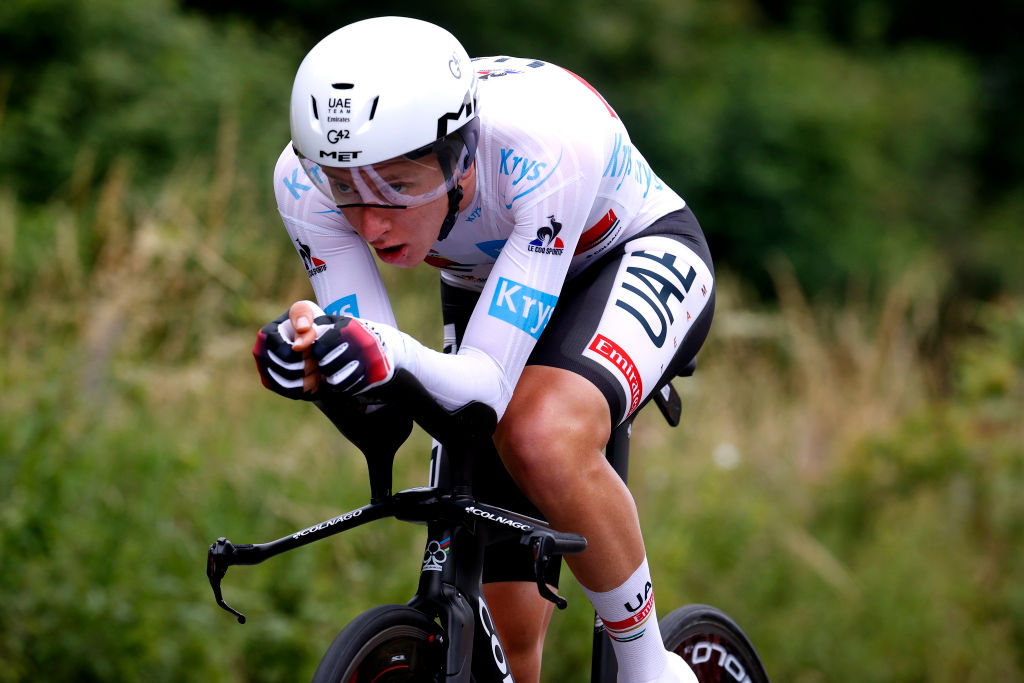Revealed: How Tour de France time trial recon helped Pogacar to victory
Peiper explains how practice made perfect for Tour de France favourite on stage 5

Five days before the Tour de France got underway, Tadej Pogačar sent his UAE Team Emirates sports director Allan Peiper a text message: “wow, it’s good we came to see this because it is important.”
Pogacar was referring to the route of Wednesday’s stage 5 time trial, where he subsequently inflicted a serious blow on his maillot jaune rivals’ chances with a stage win that has propelled him into second place on GC, just eight seconds behind Alpecin-Fenix's Mathieu van der Poel.
Pre-Tour, the defending Tour champion had come, on Peiper’s recommendation, to check out the course. And six days later, partly as a result of that reconnaissance, the 22-year-old reaped major benefits.
As Peiper told Cyclingnews on Thursday, it’s far from just himself who is involved in Pogacar’s time trial work.
“We have a performance team who are involved in his positioning and his equipment, and working on new equipment, it’s not just a one-man show.
“Guys like John Wakefield, our head trainer, or Aurelio 'Yeyo' Corral, our biomechanics guy – they’ve been doing a great job with Tadej already this year with the new bike, the new position, and the new cockpit. We’re always trying to work on something better so it is definitely a team effort behind Tadej.”
Regarding the Laval reconnaissance, Peiper said that Pogačar had already gone to see the stage 20 time trial in Bordeaux with André [Hauptmann, directeur sportif - Ed] when they were doing a recon of the Pyrenees.
“So I went down to Laval in May to have a look at that course just to see what it was like. It didn’t look like that much from the available data, but getting down there was really worth it, because I saw it wasn’t at all straightforward.
Get The Leadout Newsletter
The latest race content, interviews, features, reviews and expert buying guides, direct to your inbox!
“On the base of that, Tadej went with André to see the course the Tuesday before the Tour started in Brest and he messaged me afterwards and said: ‘Wow, it’s good we came to see this because it is important.”’
On a course as undulating as Wednesday’s, as Peiper points out, “the ability to get your pacing strategy right really matters and there’s also the technical side.”
“I could see that every 500 metres something was happening, either a roundabout, or a little downhill or a false flat, or a corner, or a small road, always something that could take your eye off the ball. But if you know where you’re going, that can give you an advantage which means you can save time.”
Apart from overshooting one corner late on, which could well be attributed to riding the course when the barriers were not in place, as Peiper says, “Tadej rode faultlessly.”
As the former pro in the 1980s and 90s and sports director with top teams like BMC sees it, checking out the course beforehand provided an extra few key pieces in the jigsaw. For one thing, he points out that Pogačar could rest as he didn’t have to go to the course so early, and for another, he didn’t have to do recon as he already knew the terrain.
“It was a little bit of a rollover from last year. Someone was out front there going to see it, and getting back to say if it’s worth him going to see it or not, yes or no. So it was a team effort to get him into the place where he could do the best work possible.”
With Pogačar now heading the GC ‘virtual’ classification, the Slovenian could now play a defensive role overall, but the situation is far from settled.
For one thing, UAE Team Emirates have not had to control Grand Tours before, although they have riders with considerable hands-on experience in that field, such as Rui Costa and Vuelta podium finisher Rafał Majka.
From UAE’s point of view, there are still a lot of rivals at a minute and a half. This could leave a window of opportunity for challengers to go early in the final on mountain stages.
From the fans’ point of view, as Peiper says, “that could make for an exciting race down the track.”
Nor is that excitement necessarily going to be confined to the set-piece mountain stages. Friday has a very tricky finish and is the longest day of racing to boot.
“It’s really important,” Peiper concludes. “In the final 50 kilometers there’s a lot happening there, with small roads and tight corners and people wanting to be in the front, climbs, and descents, and so on. It’s definitely not straightforward, and at 250 kilometers you could liken it to Liege-Bastogne-Liege. So it’s a hard race and not one that anybody will be taking lightly.”
But after Wednesday’s time trial, Pogačar is the best placed of the GC riders and with another time trial to come following the Pyrenees, even more so.
Alasdair Fotheringham has been reporting on cycling since 1991. He has covered every Tour de France since 1992 bar one, as well as numerous other bike races of all shapes and sizes, ranging from the Olympic Games in 2008 to the now sadly defunct Subida a Urkiola hill climb in Spain. As well as working for Cyclingnews, he has also written for The Independent, The Guardian, ProCycling, The Express and Reuters.
